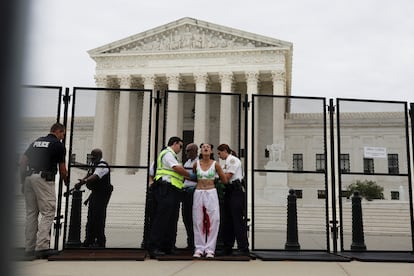US Supreme Court overturns ‘Roe v Wade,’ ending federal abortion rights
In the majority decision, the tribune ruled to strike down the 1973 precedent ruling, meaning it will be up to the states to establish their own laws


The US Supreme Court on Friday overturned Roe v. Wade, the landmark ruling that established the constitutional right to abortion in 1973. The ruling means states will now have the power to establish their own abortion laws, with 26 states set to outlaw or severely restrict access to abortions.
The 6-3 decision has been celebrated by anti-abortion groups, which have been fighting for decades to overturn the Supreme Court precedent. The ruling does not come as a surprise. A draft majority opinion, that was leaked at the beginning of May, indicated that this would be the result.
The case that triggered the Supreme Court decision is known as Dobbs vs Jackson Women’s Health Organization, an abortion clinic in the capital of Mississippi. The abortion clinic had taken the state of Mississippi to court over its 2018 law that banned nearly all abortions after 15 weeks of pregnancy. The Supreme Court however ruled that there is no constitutional right to abortion in the United States – upending the precedent set by Roe vs Wade nearly 50 years ago.
The ruling was passed by the most conservative Supreme Court in eight decades. It was backed by Amy Coney Barrett, Brett Kavanaugh, Clarence Thomas, Neil Gorsuch and Samuel Alito, who wrote the draft opinion leaked in May. Liberals Elena Kagan, Sonia Sotomayor and Stephen Breyer, who announced his retirement in January, dissented. Chief Justice John Roberts concurred in the judgment only.
The decision affects the lives of 36 million women in the United States, and divides the country in two. Women’s organizations such as Planned Parenthood believe that 26 states will tighten restrictions on abortion or ban access completely. This list includes: Alabama, Arkansas, Arizona, Florida, Georgia, Idaho, Indiana, Iowa, Kentucky, Louisiana, Michigan, Mississippi, Missouri, Montana, Nebraska, North Dakota, Ohio, Oklahoma, the Carolinas, Tennessee, Texas, Utah, West Virginia, Wisconsin and Wyoming. Thirteen of those 26 states have prepared texts known as trigger laws, which could be activated immediately or in the coming days or weeks. Two states, Texas and Oklahoma, already have approved restrictions that amount to a total ban on abortion.
Some Democratic-led states have promised to legally strengthen the right to abortion, while others, such as New York, have offered to provide access to women from states where it is banned. But many women do not have the resources to cover the cost of traveling to another state, as well as expenses such as the procedure itself, accommodation and lost wages.
In many states, the law requires that at least one day pass between the first consultation and the operation, which delays the process and increases expenses. Experts believe many women will resort to abortion pills, which are less safe. What’s more, some states are even moving to prevent their sale online.
In a bid to prevent abortion rights from being at the mercy of the Supreme Court, which has a 6-3 conservative majority – something that hasn’t been seen since the 1930s – the Democratic Party voted in May for an initiative that sought to codify abortion rights into federal law. But the Democrats, who have 50 of the 100 seats in the Senate, fell short of the 60 they needed to overcome a filibuster. One conservative Democratic even voted against the measure.
Last week, both the Democratic and Republic Party approved a rule aimed at protecting Supreme Court justices. Following the leak of the draft opinion in May, abortion rights activists have been protesting outside the homes of some of the conservative justices. Last week, an armed man was arrested outside of Justice Kavanaugh’s house and confessed to planning to murder him.
The unprecedented leak to the website Politico, which reports on the insider dealings in Washington, caused great upheaval in the political world. An investigation into how it happened has been announced, but so far no findings have been made. It is not even clear if the person who leaked the opinion intended to hurt the Republican Party or rally support.
Of the six conservative justices who voted in favor of overturning ‘Roe vs. Wade,’ three – Neil Gorsuch, Brett Kavanaugh and Amy Coney Barrett – were appointed by former US president Donald Trump. He appointed them with the express intention of toppling the landmark precedent. On Friday, he achieved his goal.
Tu suscripción se está usando en otro dispositivo
¿Quieres añadir otro usuario a tu suscripción?
Si continúas leyendo en este dispositivo, no se podrá leer en el otro.
FlechaTu suscripción se está usando en otro dispositivo y solo puedes acceder a EL PAÍS desde un dispositivo a la vez.
Si quieres compartir tu cuenta, cambia tu suscripción a la modalidad Premium, así podrás añadir otro usuario. Cada uno accederá con su propia cuenta de email, lo que os permitirá personalizar vuestra experiencia en EL PAÍS.
¿Tienes una suscripción de empresa? Accede aquí para contratar más cuentas.
En el caso de no saber quién está usando tu cuenta, te recomendamos cambiar tu contraseña aquí.
Si decides continuar compartiendo tu cuenta, este mensaje se mostrará en tu dispositivo y en el de la otra persona que está usando tu cuenta de forma indefinida, afectando a tu experiencia de lectura. Puedes consultar aquí los términos y condiciones de la suscripción digital.








































